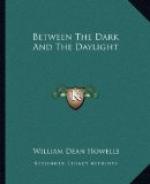“I remember,” Rulledge assented, but very carefully, so as not to interrupt the flow of the narrative. “Used to wake up everybody in the car.”
“Exactly,” the stranger said. “But this time they were all wide awake to receive him, or fast asleep, and dreaming their roles. He came along with the wire of his lantern over his arm, the way the old-time conductors did, and calling out, ‘Tickets!’ just as if it was broad day, and he believed every man was trying to beat his way to New York. The oddest thing about it was that the sleep-walkers all stopped their pulling and hauling a moment, and each man reached down to the little slot alongside of his berth and handed over his ticket. Then they took hold and began pulling and hauling again. I suppose the conductor asked what the matter was; but I couldn’t hear him, and I couldn’t make out exactly what he did say. But the passengers understood, and they all shouted ‘Burglars!’ and that girl in the stateroom gave a shriek that you could have heard from one end of the train to the other, and hammered on the door, and wanted to be let out.
“It seemed to take the conductor by surprise, and he faced towards the stateroom and let the lantern slip off his arm, and it dropped onto the floor and went out; I remember thinking what a good thing it didn’t set the car on fire. But there in the dark—for the car lamps went out at the same time with the lantern—I could hear those fellows pulling and hauling up and down the aisle and scuffling over the floor, and through all Melford bellowing away, like an orchestral accompaniment to a combat in Wagner opera, but getting quieter and quieter till his bellow died away altogether. At the same time the row in the aisle of the car stopped, and there was perfect silence, and I could hear the snow rattling against my window. Then I went off into a sound sleep, and never woke till we got into New York.”
The stranger seemed to have reached the end of his story, or at least to have exhausted the interest it had for him, and he smoked on, holding his knee between his hands and looking thoughtfully into the fire.
He had left us rather breathless, or, better said, blank, and each looked at the other for some initiative; then we united in looking at Wanhope; that is, Rulledge and I did. Minver rose and stretched himself with what I must describe as a sardonic yawn; Halson had stolen away before the end, as one to whom the end was known. Wanhope seemed by no means averse to the inquiry delegated to him, but only to be formulating its terms. At last he said:




